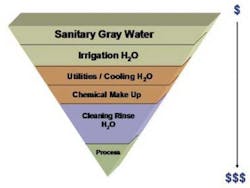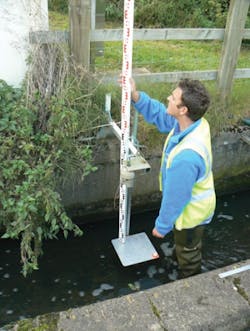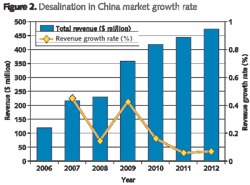Almost half the rural population in Sub-Saharan Africa still lack access to an improved drinking water supply. Water wells continue to be drilled, but little data has been gathered on groundwater sources in the region. Dr Kerstin Danert argues why a new Code of Practice hopes to raise the professional standards of borehole drilling.
Boreholes need to be appropriately specified and drilled using suitable equipment
It is estimated that globally, between 1990 and 2008, 1.8 billion people gained access to an improved drinking water supply (WHO/UNICEF 2010). Despite the gains, 884 million people still do not use an improved source for drinking-water (i.e. protected spring, well, borehole or piped supply). Of the people not using an improved drinking water supply, nearly 40% (327 million people) live in sub-Saharan Africa.
At the current rate of progress the world is expected to meet the Millennium Development Goal (MDG) target "to halve, by 2015 the proportion of people without sustainable access to safe drinking water". However, several countries are not on track to meet this target, most of which are in sub-Saharan Africa.
An estimated 83% of the urban population in sub-Saharan Africa use an improved drinking water supply, compared to only 47% of the rural population. Much work remains to be done to enable access to an improved water supply for over 270 million rural dwellers in African.
Nine Principles for Cost-Effective BoreholesPrinciple 1 Professional Drilling Enterprises and Consultants: Construction of drilled water wells and supervision is undertaken by professional and competent organisations which adhere to national standards and are regulated by the public sector.
Principle 2 Siting - Appropriate siting practices are used.
Principle 3 Procurement - Procurement procedures ensure that contracts are awarded to experienced and qualified consultants and drilling contractors.
Principle 4 Construction Method - The construction method chosen for the borehole is the most economical, considering the design and available techniques in-country. Drilling technology needs to match the borehole design.
Principle 5 Design and Construction - The water well design is cost-effective, designed to last for a lifespan of 20 to 50 years, and based on the minimum specification to provide a borehole which is fit for its intended purpose.
Principle 6 Contract Management, Supervision and Payment - Adequate arrangements are in place to ensure proper contract management, supervision and timely payment of the drilling contractor.
Principle 7 Data and Information - High quality hydrogeological and borehole construction data for each well is collected in a standard format and submitted to the relevant Government authority.
Principle 8 Database and Record Keeping - Storage of hydrogeological data is undertaken by a central government institution with records updated and information made freely available and used in preparing subsequent drilling specifications.
Principle 9 Monitoring - Regular visits to completed boreholes are made to monitor their functionality in the medium as well as long term with the findings published.
Groundwater supplies
Groundwater provides a high proportion of sub-Saharan Africa's population with a drinking water source. For example, groundwater serves 64% and 57% of the rural population in Nigeria and Ethiopia, respectively. Given its almost ubiquitous nature, generally excellent natural quality, as well as relative cheap exploitation, groundwater is likely to remain one of the main means of providing reliable water supplies for much of sub-Saharan Africa's population. A borehole equipped with a hand pump is a well-established technology for water supplies in the region and will continue to be so in the foreseeable future, unless investments increase dramatically. However, the challenge is that up to 60,000 boreholes per year will need to be drilled in sub-Saharan Africa to meet the MDG targets.
Concerns have been raised about the high construction costs and varying construction quality of boreholes in sub-Saharan Africa. Causes for this include inadequate supervision, weak regulation, poor contract management and a lack of appreciation of the realities of drilling by programme managers (Danert, 2010). Furthermore, over the years there has been relatively little attention paid to systematic information gathering about groundwater resources (Adelana and Macdonald 2008).
Groundwater still remains one of the most reliable water supplies in much of sub-Saharan Africa
Much more emphasis has been on drilling water wells than on collecting data. In order to enable groundwater supplies to fulfil their potential contribution to the MDG targets and to universal access in the future, there is an urgent need to build on the strengths and address the weaknesses of borehole drilling policies and practices in the region.
Code of practice for cost-effective boreholes
The term "cost-effective", in this instance, means optimum value for money invested in the long-term, with a borehole drilled to function over a lifespan of 20 to 50 years. Thus, the lowest cost well is not always the most cost-effective, particularly if construction quality is compromised to save money. Cheap drilling or poor construction quality can lead to premature failure of the well or contamination of the water supply. Boreholes that are subsequently abandoned by the users are clearly not cost-effective. In order for boreholes (sometimes referred to as drilled water wells or tubewells) to be cost-effective they need to be appropriately specified, properly sited and drilled using suitable methods and equipment. Where the private sector is used, competent procurement and contract management procedures need to be followed. Drillers, as well as supervisors, need to ensure adequate construction quality.
Comparing principles with realities
Between 2005 and 2010, studies to examine policies, practices and capacity with respect to borehole drilling have been undertaken in several countries, including Burkina Faso, Ghana, Ethiopia, Nigeria, Uganda and Zambia, with further work planned in Sudan. These studies have highlighted that countries are stronger in some areas and weaker in others.
For example, while registration and licensing of drilling contractors has been ongoing for some time in Ethiopia and Uganda, such a process has recently started in Burkina Faso and Ghana.
Up to 60,000 boreholes per year will need to be drilled in sub-Saharan Africa to meet the MDG targets
It was not in place by 2009 in Zambia, where essentially any contractor is able to drill in any location. Drillers' associations, which can play a key role in self-regulation, exist in Nigeria, Uganda and Burkina Faso, but not in Zambia or Ghana. Arguably stakeholders in each country have some positive experiences to share with others, as well as aspects which they could benefit through learning from others in the region. Whereas drilling contracts tend to be awarded in multiple-borehole packages in Ghana, this is not always the case in Burkina Faso or Zambia.
Meanwhile in Uganda, decentralisation has translated into very small contract packages for drillers, thus significantly increasing the cost of transportation. One of the weakest areas with respect to borehole drilling in many of the countries analysed is contract management, supervision and payment.
It is increasingly common for governments to let out drilling contracts to the private sector. Procurement practices usually use local competitive bidding processes, often with a pre-qualification stage. However, it is common for the implementation of drilling contracts to be delayed.
Across the board, drilling supervision is often undertaken by young and inexperienced graduates. Not only can they be outwitted by drilling contractors, but it is common for supervisors to be reliant on the contractors for logistician support. This, coupled with poor remuneration makes it difficult to ensure construction quality. Therefore, there is an urgent need to raise the capacity of drilling supervision throughout the continent to provide a basis for water well longevity.
From the perspective of the driller, frequent delays in payment for works completed are one of the numerous challenges of their business environment, alongside difficulties in accessing credit and allegations of irregularities in tender processes.
Equipment specifications
At a technical level, specifications for drilling equipment are often much higher than they need to be, particularly in the case of drilling wells of shallow depths. Given the high pay back fees for heavy drilling rigs, this directly impacts on cost. In some areas, hand drilled or hand dug wells would offer solutions of considerably lower cost but are not considered. Suitable well designs which are fit for the intended purpose, rather than overdesigned ought to be considered.
There are arguments for constructing boreholes which can subsequently be upgraded from a hand pump source to a submersible pump with a small piped network.
However, the reality is that in rural areas in sub-Saharan Africa such scheme expansions are very rarely made. Governments and NGOs are busy trying to install new sources in order to outpace population growth, and water users themselves are either not able, or not empowered to expand supplies.
In order to build up an in-depth understanding of groundwater resources and hydrogeology, the collection and storage of borehole construction data by the relevant authority is essential. This is an aspect of groundwater development which is particularly weak in many countries.
In Burkina Faso, Ghana and Zambia, the requirements and responsibilities with respect to data are not always clear and borehole logs are not always submitted to the authority. Given the lack of licensing for drillers in Ghana or Zambia there is little incentive for the drillers to do this. While in Zambia there is a pilot project to enter borehole completion data into a database, this is not the case in Burkina Faso or Ghana.
Recommendations
Ensuring that the Code of Practice is turned into action on the ground requires full engagement of key funding agencies for rural water supplies and implementing organisations. Agencies such as the World Bank, the African Development Bank, bilateral donors, international NGOs, as well as national governments and the private sector in sub-Saharan Africa should stock of how they support and implement drilling programmes.
Cheap drilling or poor construction quality can lead to premature failure of the well or contamination of the water supply
Ultimately procedures that bring about cost-effective boreholes should be set out and adhered. In order to achieve this there is a need for long-term investment to raise the capacity of the institutions and individuals involved. Ensuring that drilled water wells are cost-effective – over the long term - is something that rural dwellers in Africa can expect from the organisations who try to improve access to water supplies.
References
[1] Adelana S and Macdonald A (2008) Groundwater research issues in Africa, in Adelana S and MacDonald A (Eds) (2008) Applied Groundwater Studies in Africa, International Association of Hydrogeologists, CRC Press.
[2] Danert K, Carter, RC, Adekile, D and MacDonald A (2010) Cost-effective boreholes in sub-Saharan in Africa in Yongxin X and Braune E (Eds) (2010) Sustainable Groundwater Resources in Africa, UNESCO International Hydrological Programme, CRC Press ISBN 978-0-415-45273-1
[3] WHO/UNICEF (2010) Progress on Sanitation and Drinking Water 2010 Update, World Health Organisation/UNICEF. Available on the World Wide Web: http://www.wssinfo.org/
[4] RWSN (2010). Code of Practice for Cost-Effective Boreholes, Rural Water Supply Network. Available from www.rwsn.ch
Author's note: Dr Kertin Danert is coordinator for cost-Effective Boreholes and task manager at the Rural Water Supply Network (RWSN), a global knowledge for rural water supply technologies and approaches. The Code of Practice for Cost Effective Boreholes was produced after five years of research, documentation and reflection by the Rural Supply Network (RWSN). For more information, please email: [email protected].
More Water & WasteWater International Current Issue Articles
More Water & WasteWater International Archives Issue Articles





